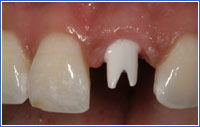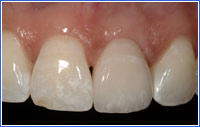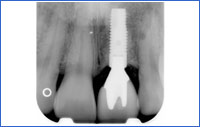Implants
Dental implants are surgically placed into the jaw and then usually crowned.
Implants are also used to retain dentures in patients who are edentulous. Dentures can be made to fit over two to four implants in the upper or lower jaw to enhance denture retention and stability.
Some patients may ask their primary care clinician whether they should have dental implants placed. For patients with a healthy mouth, a history of good oral hygiene, and few medical problems, this is likely a straightforward procedure.
Patients with decreased jaw bone mass (i.e., osteoporosis, low hanging maxillary sinus, or bone resorption from an extraction site), diffuse caries, or difficulty with hygiene due to other medical co-morbidities may not be good candidates for dental implants.
Implant placement is contraindicated in patients who have received IV bisphosphonates. Poorly controlled diabetes or serious bleeding disorders are also a concern.
Implant Without Crown

Implant With Crown

Radiograph of Implant

References
Diz P, Scully C, Sanz M. Dental implants in medically compromised patients. Journal of Dentistry. 2013; 41:195-206.
Hwang D, Wang HL. Medical Contraindications to Implant Therapy: part 1: absolute contraindications. Implant Dent. 2006 Dec; 15(4): 353-60. doi: 10.1097/01.id.0000247855.75691.03. PMID: 17172952.